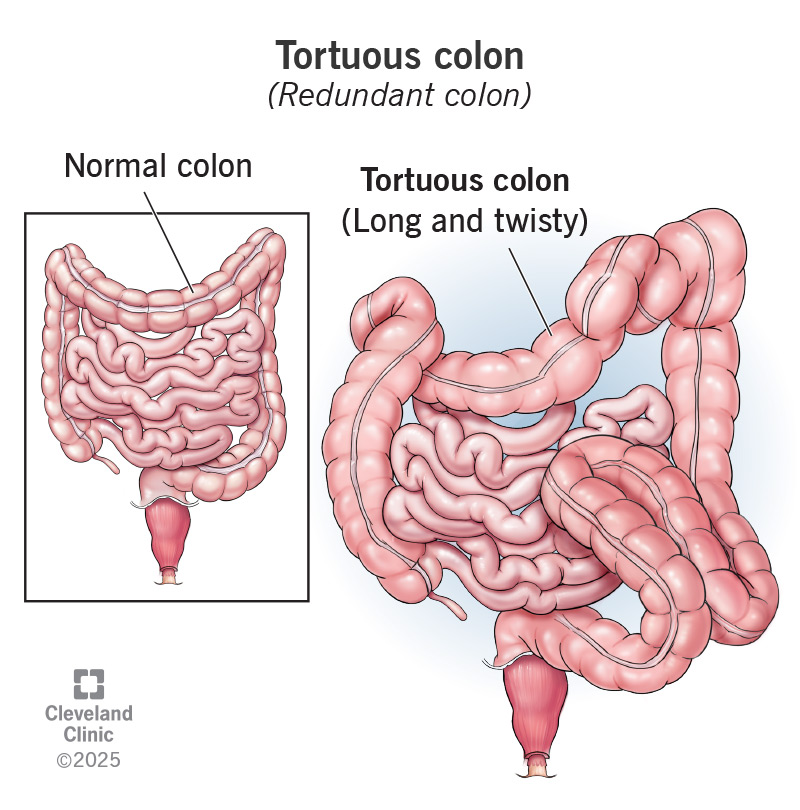A tortuous colon (redundant colon) is extra-long, with more loops than usual. It may be longer in one segment, or throughout. It may not be significant, but sometimes it’s related to constipation and a slow intestinal transit time. Your healthcare provider will mention it if they notice it during a colonoscopy.
Advertisement
Cleveland Clinic is a non-profit academic medical center. Advertising on our site helps support our mission. We do not endorse non-Cleveland Clinic products or services. Policy

Image content: This image is available to view online.
View image online (https://my.clevelandclinic.org/-/scassets/Images/org/health/articles/tortuous-colon-redundant-colon.jpg)
“Tortuous colon” or “redundant colon” is a description you might see on your colonoscopy report, or another exam of your colon. It means your colon is unusually long and twisty. The word “tortuous” means extra long with lots of twists and turns. “Redundant” means excessive or more than necessary.
Advertisement
Cleveland Clinic is a non-profit academic medical center. Advertising on our site helps support our mission. We do not endorse non-Cleveland Clinic products or services. Policy
The longer your colon is, the more twists and bends it takes in order to fit in your body. This can make it harder for a healthcare provider to advance a colonoscope all the way through. The same is true for poop traveling through your colon. It might take longer, and in the meantime, it might become drier.
Having a tortuous colon won’t necessarily cause any symptoms. But some people have symptoms like:
This might be because poop is taking a longer time than usual to make its way through your colon.
Healthcare providers aren’t sure whether a tortuous colon is something you’re born with, something that happens over time or both. Slow-moving, hard stools pushing through your colon may play a part in stretching it out. Genetics may help determine how your colon forms and how it changes over time.
If you have problems moving stool through your colon, having a longer and twistier pathway won’t help. The longer your stool spends in your colon, the harder and drier it becomes. This is because part of your colon’s job is absorbing water from your stool. A redundant colon may absorb more water than needed.
Advertisement
A tortuous colon might also make it more difficult for your provider to complete a colonoscopy. They might not be able to get all the way through the twists and turns with the colonoscope. Your provider might recommend additional colon cancer screenings to look for colon polyps they might have missed.
Most people learn about their redundant colon after a colonoscopy. But other exams and procedures may also discover it. Healthcare providers don’t diagnose a redundant colon as a condition in itself. But they will make note of it if they find it. This is because it may relate to other conditions you might have.
You might not need any treatment. But if you have symptoms related to slow or infrequent bowel movements, your healthcare provider will treat those symptoms. Treatment usually starts with changes to your eating plan and lifestyle. Your provider might suggest taking fiber supplements, probiotics or laxatives.
If your issues don’t improve with these changes, your provider might need to test you for other causes of constipation. You may have another condition besides your redundant colon. Your treatment plan will depend on your diagnosis. Surgery is rarely necessary, unless you have serious complications.
See a healthcare provider if you have ongoing bowel problems that don’t respond to common remedies. Occasional constipation can happen to anyone. But if it’s ongoing, it can become increasingly serious. Pooping problems don’t just affect your quality of life — they can snowball into bigger issues.
If your colon is normally healthy, you probably don’t need to worry about how long it is. But if you’re prone to constipation, your tortuous colon may be related — as a cause or as an effect, or both. You may need to take extra steps to protect your bowel health and prevent constipation from worsening.
You might be unsettled to learn that part of your anatomy is different from the typical. You might think, “But I don’t feel like anything’s wrong!” If you don’t, then it probably isn’t. On the other hand, if you’re thinking, “I knew there was something going on!” Then your redundant colon might mean something.
This discovery is just one landmark along your journey to the right diagnosis and treatment. It doesn’t explain everything. But it might be the validation you need to go on searching for answers. Your healthcare provider will put it in your records so that other providers will know it might be a factor.
Advertisement

Sign up for our Health Essentials emails for expert guidance on nutrition, fitness, sleep, skin care and more.
Learn more about the Health Library and our editorial process.
Cleveland Clinic’s health articles are based on evidence-backed information and review by medical professionals to ensure accuracy, reliability and up-to-date clinical standards.
Cleveland Clinic’s health articles are based on evidence-backed information and review by medical professionals to ensure accuracy, reliability and up-to-date clinical standards.
If you have issues with your digestive system, you need a team of experts you can trust. Our gastroenterology specialists at Cleveland Clinic can help.
